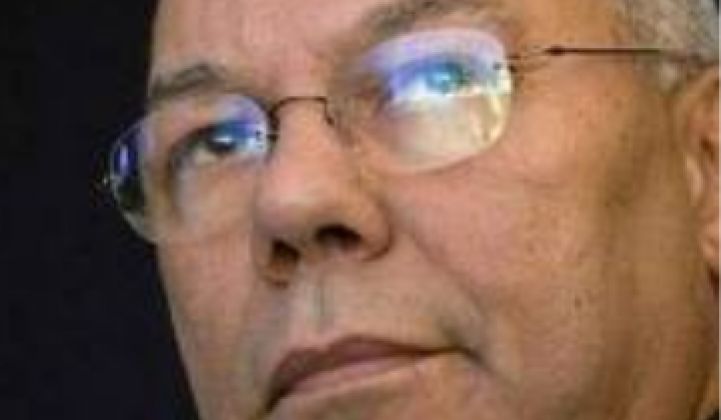Defining leadership, former Secretary of State and Chairman of the Joint Chiefs of Staff Colin Powell gave the wind industry its battle plan in a keynote address he delivered recently to the American Wind Energy Association (AWEA) Fall Symposium.
“Your job is to inspire,” Powell told the captains of the wind industry in his audience, because “inspired is self-motivated.” The way to inspire, Powell told them, is to have not just goals but purpose. The wind industry’s purpose, beyond generating electricity with turbines, “is to make sure America and the world becomes more and more independent of fossil-based electricity generation.”
“We do know we’ve got challenges,” Denise Bode, AWEA’s CEO said at the Symposium’s opening session, detailing those challenges by describing the outcome of the November 2 election. “The 112th Congress will have fifteen freshman senators and 94 first-time representatives,” Bode said. “We’ve never had that big a change in our history.”
Iowa Governor Chet Culver, who lost his job November 2nd, was more specific about wind’s losses. “We have 29 new governors,” Culver said. “Unfortunately, we lost 24 members of the Governors Wind Energy Development Coalition.” Though 24 states remain in the coalition, many of the new governors are not yet certain the political climate will support their participation. This is particularly bad news, because governors are often sensitive to their states’ inclinations, and much that supports renewable energy happens at the state level.
But Culver was not finished. “Unfortunately, we lost 49 members of the U.S. House who voted for the RES,” he added. “In state legislative races, the Republicans gained 680 seats.” Polling data strongly suggest that Republicans are less supportive of renewables in general and wind in particular.
Culver said he remains hopeful. “I’m confident we can overcome the realities of this historic election but it’s going to take an even more concerted, focused effort because,” he said, “this is the right thing to do for our country, this is the right time, and we still have a lot of momentum. We just have to be aggressive.”
“With every change,” Bode pointed out, “comes an opportunity.” It is, she said, “a political landscape in which we have opportunities to frame the debate.”
Not everybody is as hopeful. “The situation is not going to get anything but worse,” Dan Haas, the Director of Strategic Development for Berkhalter Rigging and a seventeen-year wind industry veteran, confided recently. “I’m a dyed-in-the-wool Republican,” he explained, and was “pretty happy” about the election outcome “except for the fact that it’s going to kick my industry when it’s down. It’s going to take a while for this new group down there in D.C. to get around to dealing with the renewable energy issue.” By the time they do, Haas said, “We’re going to have another hole in the business because we’re going to hit year-end and everything’s going to expire and we’re going to be standing around wondering what’s next.”
In his keynote, Powell acknowledged that times are tough at present but noted that “the demand for energy of all types will keep growing, and whatever else happens, that demand will have to be met,” he said. “This year isn’t as good as last year. You’re waiting for the government to give you what you need to plan.” But, he said, “there’s no question in my mind that the curve is in the right direction.”
Fluctuations will continue, often “driven by the price of natural gas,” Powell said, coming back to the theme of purpose, “but you are in a stable growth pattern, not just for the purpose of making electricity but for the purpose of making America safer, making America more competitive and, even more importantly, making sure there’s enough energy not just for us but for the people of the world.”
Powell urged the wind industry to lead. “You’ll know you’re a good leader,” Powell said, paraphrasing one of his own mentors, when “your followers are anxious, afraid, nervous, wondering what’s going to happen next,” but “they stick with you just out of curiosity to see how you get them out of the hole.”
The wind industry, Powell said, is in a difficult place. “You’re not getting the answers you need,” he acknowledged. “You need answers. You need support. You need to know what your congressmen are going to do for you. The tax structure is a mess.” But, he said, “We don’t know what’s happening.”
Powell, like other commentators, believes the new Republican ascendancy could end in the breaking of political gridlock because it spreads the responsibility to get things done between both parties, giving both a reason to compromise and achieve.
But, Powell said more than once, this is a period of uncertainty in a tempestuous political system. “It’s always been tough in political life,” Powell said. “The founding fathers did not create a system that was supposed to be smooth and easy. It was always supposed to be a clash of ideas -- people believing in something and fighting for it.”



